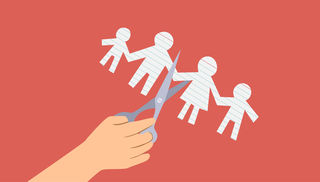Relationships
Broken Family Ties and How to Cope With Estrangement
Family estrangement can be painful, but you can manage and prevent broken ties.
Posted January 30, 2020 Reviewed by Matt Huston

When a family member voluntarily walks away, you may miss them and feel bewildered, distraught, angry, ashamed, frustrated, and disappointed, especially if the hope of reconnection is dashed. In this way, the grief of family estrangement can be even more painful—or at least more complicated—than the grief over a loved one who has died.
So why do people cut ties with their family members? Are there any ways to handle or alleviate the situation?
There hasn't been much research about family estrangement, in part because it’s a challenging thing to study—many people don’t want to talk about falling out with their family. Recently, however, researchers have been paying more attention, especially to estrangements between parents and adult children, and have learned four key things:
1. Estrangement between parents and adult children is more common than you might think. Given how much we talk to each other about family—in the news, in the movies, in our daily water cooler conversations, and even in our complaints about holiday disputes—you would think that almost all families are intact, even if there are disagreements.
A large survey of young adults, all college and graduate students at universities in the northeastern U.S., found that about 17 percent experienced estrangement from an immediate family member, most commonly from the father. When older adults were surveyed, researchers found that 12 percent were estranged from a child or children.
It’s the adult children that usually cut off contact, while only about 5-6 percent of parents initiate excommunication. The reason for this might be because, from a parent’s perspective, a child is almost always the strongest bond. But children may grow up to meet a partner or have children of their own, and their responsibilities and bonds shift primarily to their own nuclear family.
2. Parents cut off children usually because they don’t approve of their kids' other relationships. In rare cases where the parents cut off the child, the most common reason is that they object to others in the child’s life—a spouse, someone they’re dating, in-laws, or a stepparent. It’s less common for parents to cut ties with a child because they felt their child was selfish or thankless. These findings are from a large interview study with almost 900 participants, both parents and adult children, who have experienced estrangement. But it’s also important to keep in mind that this study didn’t cover all of the many reasons why excommunication might occur between parents and children.
3. Adult children mostly cut off parents because of abuse, continued toxic behaviors, or feeling unaccepted or uncared for. Adult children usually reported very different reasons for cutting off contact with their parents, such as:
- Abuse, including emotional, physical, and sexual abuse in childhood
- Ongoing harmful behaviors, including anger, malice, insensitivity, disrespect, and hurtfulness
- Feeling a lack of support concerning their life choices, relationships, disability status, and other important aspects of their life
One participant in the study poignantly said, “The cumulative pain because of the past never went away, never was reconciled, never was discussed, never was apologized for, never acknowledged, nothing. I hoped I could let it go, but it never went away.”
4. Estrangement often doesn’t last forever. While the vast majority of adult children feel confident that they never want to reconnect with the parent that they’ve cut off, parents are unlikely to feel that way.
But when it comes to actual actions, a major research report on family estrangement found that few estranged relationships actually stay so, especially when a mother or daughter is involved. For example, only 29 percent of children who had cut off their mothers maintained those estrangements permanently. Most of them had cycles of estrangement and reconciliation.
How to restore damaged family ties
Knowing what we know now about family estrangement, how can we try to fix such situations? Many people, especially parents, deeply yearn for reconnection. Here are some tips for surviving, reconnecting, and preventing broken family ties:
When going through an estrangement, accept what you can’t control but be ready to offer second chances. I wish there was a magic formula I could give to people who yearn to reconnect with a family member. The truth is that relationships, especially close ones, are so complicated that it’s impossible for me to reassure you that reconnecting is possible. And because it takes two to tango, like in any relationship or lack thereof, the first thing to understand is that you can't always manage the outcome.
Of course, it’s much easier said than done to accept your lack of control. If your heart aches so strongly, surely there's something you can do! That something may be to make peace within yourself by acknowledging any responsibility you may have for the relationship rupture, and by finding honest compassion for the person you lost and for yourself.
If you can accept this, you will be ready to take up any second chances you are offered, which may very well come along at some point, given what we know about how people cycle between connection and estrangement.
If you’re given a chance at rapprochement, be willing to recognize, accept, and change. What should you do if your family member reaches out and you get an opportunity to reconnect? Or what if you’ve never been estranged from your parent or child, but there is so much hurt in the relationship that it seems to be headed down that path?
Improving or avoiding broken ties requires similar types of effort. Given what we know about why adult children walk away—lack of acknowledgment about a past hurt or trauma, lack of acceptance, and toxic behaviors like judgment and control—we can try to reverse-engineer these behaviors by doing the opposite...
Acknowledge and apologize for past hurts and traumas. Even if you were not the person who directly inflicted the damage, sometimes the denial of someone else’s wrongdoing can be just as painful. Or it’s possible that you don’t think you’ve inflicted trauma, but your loved one sees it that way. Now is not the time to get into the nitty-gritty about definitions—denial of what the other person feels deeply to be true is a sure way to build the estrangement wall higher. A simple acknowledgment of their experience, without being defensive, can bring a powerful catharsis.
Accept the person just as they are. Nobody is perfect and there are also lots of reasonable disagreements between reasonable people about the right and wrong ways to live. So, between all this doubt and these human shortcomings, ask yourself: “What do I want more—for this person to conform to my standards, or for this person to be in my life?” Make your best efforts to prove that you’re willing to listen and learn, even if you can’t completely change your worldview overnight.
Change behaviors that your loved one finds toxic. We don’t often do things to hurt our family members on purpose. Perhaps you’ve always thought you were a responsibly strict parent, diverting your child from what you thought were risky ways. You were sure that as they grew up, they would appreciate your efforts. But sometimes what you intend as helpful is experienced as quite hurtful by the person on the receiving end. So be open and non-defensive if your loved one tells you that your behavior hurt them. You have a right not to be attacked, of course, and to maintain your sense of dignity. You can work on building this mutual respect in the long run. But for now, the most urgent thing is to show that you’re open to change, because opportunities for reconciliation don’t last forever.
There is support for people who are estranged from family. Now that social workers and healthcare providers are becoming more cognizant of the deeply impactful issue of family estrangement, there is an increasing number of resources for helping people to cope. For example, Stand Alone is an organization based in the U.K. that conducts research, offers support, and raises awareness about this issue. It may also offer you a place for community when you are feeling isolated from family estrangement.
A version of this piece, titled Family Estrangement—Why Families Cut Ties and How to Mend Them, appeared on Savvy Psychologist.
Facebook image: Photographee.eu/Shutterstock




